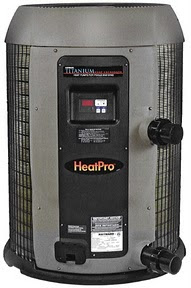Every year as we drift closer to spring time in New England we start getting calls from pool owners about installing a new pool heater. When people start thinking about extending their pool season with a heated in-ground pool they want to know what their options are and what will best fit their needs.
Today there are two main options for in-ground pool heaters; gas fired heaters and electric heat pumps. Gas fired heaters have been the staple here in the north east for some time now, but with the rising costs of propane and natural gas, as well as advances in electric heat pump technology, heat pumps are starting to become more prevalent in the area.
Below I have layed out some of the major differences between the two options. I won’t go into too much technical details within the article but if you have specific questions please leave a comment below and I will be happy to answer them for you.
>Gas fired heater Pros
- Heats up fast, and you only need to run pool heater when you want to swim
- Can extend the pool season in the cooler months regardless of outside temperature
- Less up front cost
Gas fired Pool heater Cons
- Requires use of expensive propane or natural gas fuel making for higher operating costs
- If you don’t have natural gas at your home you will need to set up large propane tanks on the property
- Due to the many gas plumbing parts, maintenance and repairs tend to be expensive
Electric Pool heater pump pros
- Lower operating costs
- Environmentally friendly
- Continuous heat flow and even temperature
Electric heater pump cons
- Higher upfront costs
- Does not heat up fast must run continuously to maintain temperature
- Can not run in cooler weather months, average temp must be above 45 degrees to operate

Over the last couple of pool seasons we have been installing more and more heat pumps on in-ground pools, but that does not mean people are abandoning gas pool heaters altogether. How you heat your pool all depends on how your pool is used throughout the year.
Due to the speed at which a gas pool heater can raise the temperature of the pool water, you may opt for a gas heater if your pool only gets used on weekends or, just a couple times a week. This way you only have to run the heater when you want to use the pool, just fire it up in the morning and enjoy a comfortable swimming temperature for your afternoon fun. In this case the higher operating costs won’t be much of a factor because you are not running the gas heater that frequently. Also if you really want to extend your pool season and enjoy your pool from April to November the gas option might work for you, as when the temperature drops in these cooler months the heat pump will not maintain the pool water nearly as well as a gas heater.

If your pool gets a lot of use and people are in and out daily or many times a week, the lower operating costs of the electric heat pump might be more beneficial for you and your family. Your heat pump would be running almost continuously to heat the outside air and raise the pool temperature, but it would maintain a continuous even flow of warm water into your pool so you don’t have to plan ahead every time you want to swim. Using a gas fired pool heater in this manner would get very expensive very fast. Because of this we now often install electric heat pumps over gas heaters for our new in-ground pool customers as these families anticipate lots of use of their new pool installation. Even though the electric heat pump is more expensive up front its value increases the more you use your pool.
[message type=”info”]Looking for more pool energy savings? Read our article: Variable speed pool pumps help heat your pool more efficiently[/message]
You may have noticed I did not talk about solar pool heaters in this article. At present I do not believe there is a reliable and cost effective solar heating solution available for pool owners here in New England. I suspect in years to come the technology will become more efficient and less expensive and could be a viable option for pool owners, but the technology is just not there yet in my opinion.
As with many in-ground pool options there is no better or worse here, it is all relative to how you use your pool. Take some time to think about your pool usage and decide what fits your needs best. Do you just need a fast acting gas pool heater to use on the weekends and want to extend your pool season into the cooler spring and fall months? Or do you just want to maintain temperature continuously throughout the pool season and opt for the cheaper operating costs of the electric heat pump?
We get asked these questions a lot at Precision Pool Construction and I hope this quick guide helped answer some of them for you.


Comments are closed.